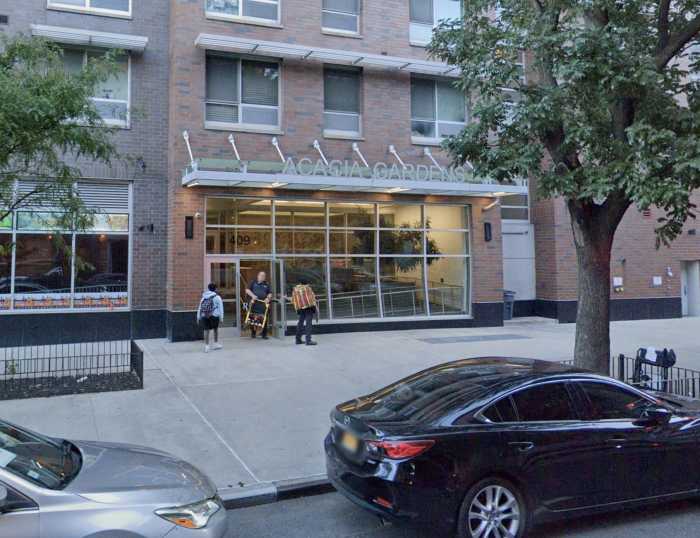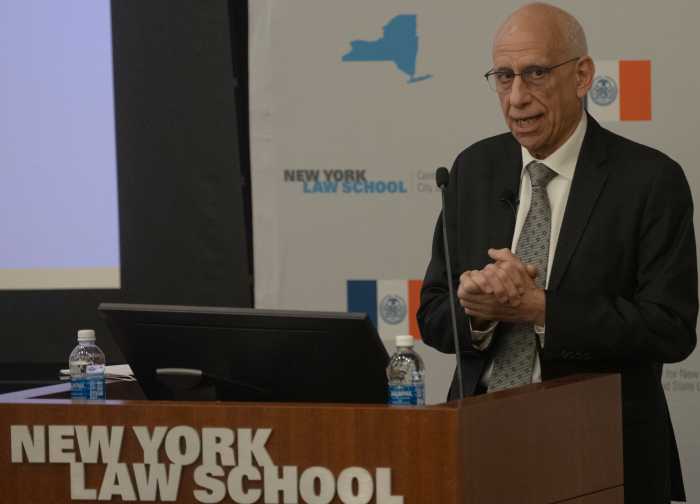Until recently, few people other than academics and diehard
Shakespeare aficionados had ever heard of "Cymbeline."
Even this reviewer, who learned the beautiful poem "Hark!
hark! the lark" at her mother’s knee, never dreamed it came
from this Shakespearean romance.
Then, suddenly this season, not one, but two companies brought
"Cymbeline" to New York City – Theater for a New Audience
with its production at the Lucille Lortel on Christopher Street
in Manhattan, and the London-based Shakespeare’s Globe Theatre,
making its debut at the Brooklyn Academy of Music. Both are highly
original stagings.
Bartlett Sher’s production for New Audience takes place not only
in ancient Rome, but also in medieval Japan and the American
West. The Globe Theatre’s Mike Alfreds pares "Cymbeline"
down to six actors and two musicians performing on a stage that’s
empty, but for several percussion instruments played to great
effect.
Even at a time when producing Shakespeare using all the traditional
conventions seems to induce nothing but yawns, tweaking "Cymbeline"
takes an unusual amount of courage. The play is not only largely
unknown to contemporary audiences, but also has a plot so convoluted
and improbable that Samuel Johnson labeled it "unresisting
imbecility."
What Johnson missed, however, was that "Cymbeline"
is also funny and impudent, and contains passages with tremendous
lyrical beauty – which is exactly what sustains the play throughout
the Globes’ three-hour-plus production on stage now through March
17 at the BAM Harvey Theater on Fulton Street.
The historical source of "Cymbeline" is Holinshed’s
"Chronicles" (1577), but the theme of the wager is
taken from Boccaccio’s "Decameron."
Cymbeline, king of Britain, having lost his two sons, who were
abducted by Morgan, wants his daughter, Imogen, to marry the
doltish Cloten, son of his second wife. Imogen, however, is already
married to Posthumus, a gentleman of the court. In a fit of anger,
Cymbeline banishes Posthumus, who flees to Rome. There he meets
Iachimo, a cynical man-about-town who believes no woman can be
as faithful as Posthumus claims Imogen to be.
Iachimo makes a bet with Posthumus that he will be able to seduce
Imogen. When Imogen repulses his advances, he slips into her
bedroom at night, steals the bracelet Posthumus has given her,
and gets enough details of her bedchamber and her supine body
to convince Posthumus of her infidelity. Meanwhile, Cloten licks
his wounds and plots his revenge.
"Cymbeline" contains several subplots found elsewhere
in Shakespeare’s work. There’s jealousy and a falsely accused
woman as in "The Winter’s Tale" and "Othello";
potions that cause a deathlike state that really isn’t death,
as in "Romeo and Juliet"; and cross-dressing and mistaken
identity, as in too many plays to mention.
Even before the audience is completely settled, Terry McGinity
(Cymbeline/Jailer/ Jupiter) explains who’s who and what’s what
in the play – providing the kind of roadmap essential in a production
where the scenes move back and forth from England to Rome and
to Wales – and the actors slip in and out of roles without even
the benefit of a change in costume. They all wear similar white
pajamas.
McGinity’s introduction and reminders from the actors, as well
as superb acting keep the audience from descending into confusion
and the production into chaos. In fact, the dual and triple roles
add an intellectual and emotional dimension that at once deepens
and expands Shakespeare’s original concept.
Watching Mark Rylance switch from the noble but foolish Posthumus
to the foolish but noble (if only by birth) Cloten is more than
entertaining; it’s also enlightening. Abigail Thaw’s evil, conniving
queen is a striking contrast to her generous and loving Cadwal,
adopted son of Morgan and secretly Imogen’s brother.
It isn’t until the end of the play when the mysteries are resolved
and everyone is present onstage at the same time that confusion
begins to creep into the production. This reviewer found herself
paying more attention to who was playing whom than what was happening.
Just as Shakespeare seems to have written himself into a hole
from which only Jupiter can extricate him, Alfreds seems to have
directed himself into a dark corner that only the audience’s
goodwill, concentration and continued inclination to play along
can brighten.
Alfreds has staged "Cymbeline" for a broad comic effect.
For the most part he is successful. The play is funny in unexpected
and outlandish ways. Sometimes all it takes is an actor’s hesitation
or shrug of the shoulder to produce roars of laughter from the
audience. But too often this is at the expense of the romance
– which is what the play is about, after all.
It isn’t until the end, however, when Cloten gets his comeuppance
that the comedy does not seem to have served the play as well
as one might suspect. By making Cloten into a buffoon rather
than a true villain, Rylance and his director have made it hard
for the audience to accept and understand why his fate is so
terrible and so bloody, especially when the truly evil Iachimo
fares so much better.
But minor contentions aside, "Cymbeline" is a joyful
and exuberant theater experience, if only for the pleasure of
watching actors creating characters out of language and movement
and a director forging a collaborative bond with his audience.
"Cymbeline" doesn’t come around often enough to miss
this one.
"Cymbeline" plays March 14
and 15 at 7:30 pm, March 16 at 2 pm and 7:30 pm, and March 17
at 3 pm. Tickets are $25, $40 and $55. The BAM Harvey Theater
is located at 651 Fulton St. For tickets and more information,
call (718) 636-4100 or visit www.bam.org.

























